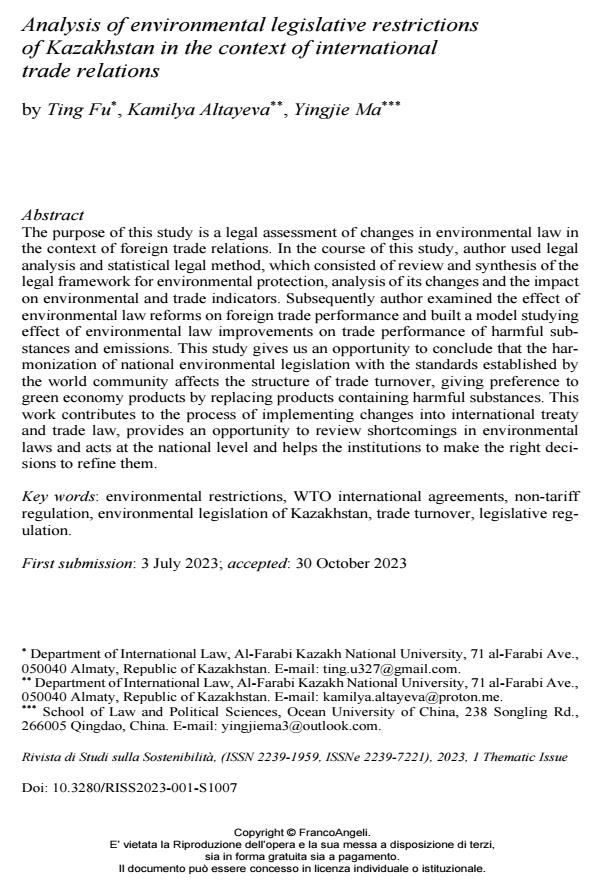Analysis of environmental legislative restrictions of Kazakhstan in the context of international trade relations
Titolo Rivista RIVISTA DI STUDI SULLA SOSTENIBILITA'
Autori/Curatori Ting Fu, Kamilya Altayeva
Anno di pubblicazione 2023 Fascicolo 2023/1 T.
Lingua Inglese Numero pagine 17 P. 101-117 Dimensione file 148 KB
DOI 10.3280/RISS2023-001-S1007
Il DOI è il codice a barre della proprietà intellettuale: per saperne di più
clicca qui
Qui sotto puoi vedere in anteprima la prima pagina di questo articolo.
Se questo articolo ti interessa, lo puoi acquistare (e scaricare in formato pdf) seguendo le facili indicazioni per acquistare il download credit. Acquista Download Credits per scaricare questo Articolo in formato PDF

FrancoAngeli è membro della Publishers International Linking Association, Inc (PILA), associazione indipendente e non profit per facilitare (attraverso i servizi tecnologici implementati da CrossRef.org) l’accesso degli studiosi ai contenuti digitali nelle pubblicazioni professionali e scientifiche.
The purpose of this study is a legal assessment of changes in environmental law in the context of foreign trade relations. In the course of this study, author used legal analysis and statistical legal method, which consisted of review and synthesis of the legal framework for environmental protection, analysis of its changes and the impact on environmental and trade indicators. Subsequently author examined the effect of environmental law reforms on foreign trade performance and built a model studying effect of environmental law improvements on trade performance of harmful sub- stances and emissions. This study gives us an opportunity to conclude that the har- monization of national environmental legislation with the standards established by the world community affects the structure of trade turnover, giving preference to green economy products by replacing products containing harmful substances. This work contributes to the process of implementing changes into international treaty and trade law, provides an opportunity to review shortcomings in environmental laws and acts at the national level and helps the institutions to make the right deci- sions to refine them.
Parole chiave:environmental restrictions, WTO international agreements, non-tariff regulation, environmental legislation of Kazakhstan, trade turnover, legislative reg- ulation.
Ting Fu, Kamilya Altayeva, Analysis of environmental legislative restrictions of Kazakhstan in the context of international trade relations in "RIVISTA DI STUDI SULLA SOSTENIBILITA'" 1 T./2023, pp 101-117, DOI: 10.3280/RISS2023-001-S1007